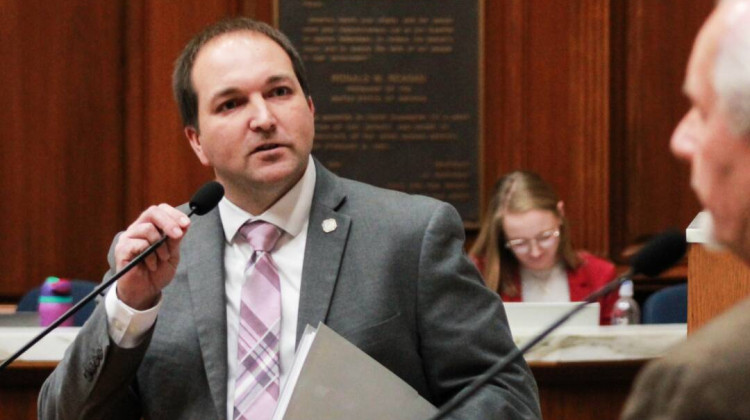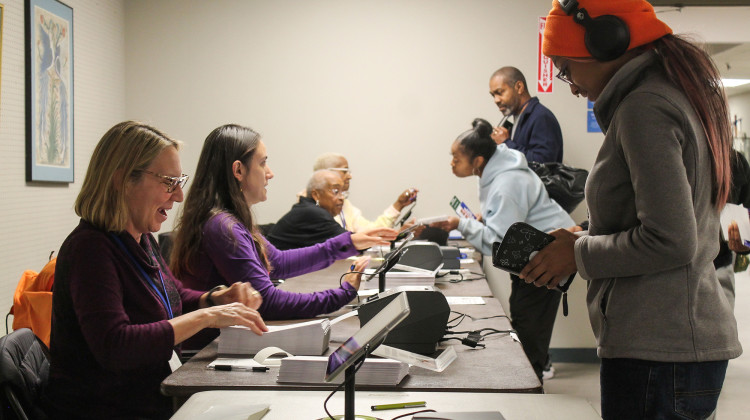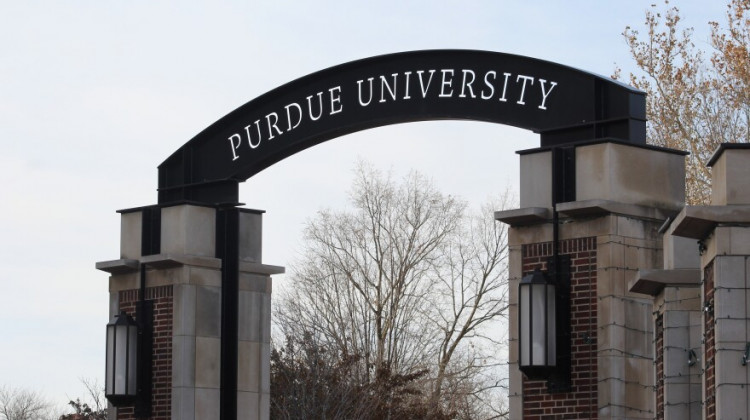
Rep. Vernon Smith (D-Gary) questions Rep. Chuck Goodrich (R-Noblesville) about House Bill 1001.
Screenshot of iga.in.gov livestreamLawmakers have discussed and advanced a variety of education bills during this year's legislative session.
From bills that aim to raise low reading scores to remedies for students using cellphones in class, lawmakers will spend the second half of session considering bills from the opposite chamber with fresh eyes and advancing initiatives with widespread support.
The deadlines for bills to be passed on their third reading this year is March 4 for the House and March 5 for the Senate. Both chambers must be adjourned by March 14.
Reading
Two reading bills,Senate Bill 1 andSenate Bill 6, aim to improve low reading scores and literacy in schools.
SB 1 requires the state to begin testing students’ literacy skills in second grade instead of third grade. The state already introduced a pilot program that testedmore than half of Indiana’s second graders in 2023.
The bill would also expand summer school options for students who fail the state’s reading exam, the IREAD-3, and retain the majority of third graders who have not passed the test by the end of the year. But parents could appeal through a new process.
Another amendment specifies that students who fail the reading exam and have a summer school attendance rate of less than 90 percent must participate in an individualized reading plan. The amendment also added new reading intervention requirements for school districts and created an exemption for students who would have been retained, but have already been held back twice.
The measure was also changed to require school districts to emphasize the importance of reading to kindergarten students and their parents. It would also mandate schools make parents aware their children could be retained if they do not pass the state reading exam by the end of third grade.
Some parents, educators and lawmakers said students could face negative social and emotional effects of retention.
The bill’s author, Sen. Linda Rogers (R-Granger), said students are more at risk of negative effects in the future if they leave third grade without foundational reading skills. Rogers has sought to characterize her legislation as an attempt to address the state’s reading crisis and said mandated retention is the last option for students who need additional help to develop foundational reading skills.
SB 6 tasks the Indiana Department of Education with identifying students in grades four through eight who did not pass the state’s reading exam and who are not proficient in reading. The department would be required to create guidance on how to help those students increase their literacy skills.
Religious education and chaplins during school hours
Senate Bill 50, authored by Sen. Stacy Donato (R-Logansport), would allow clergy members to serve as chaplains in public schools. Donato said the bill could help some schools that struggle to hire more school counselors. The bill does not specify if chaplins would be paid.
The measure stipulates that chaplains could provide religious guidance but only to students who have permission from their parents, are emancipated minors or are older than 18 years old. All other services would be secular.
Chaplains must report concerns that a student will harm themselves or others to a school counselor after some critics voiced concern that chaplains would have different reporting requirements.
Some critics of the bill said the role of chaplains in schools is not clearly defined and the position does not require experience with children or child psychology. The bill stipulates chaplains must have a master’s degree in divinity, theology, religious studies or a related field and two years of counseling experience.
Another bill,House Bill 1137, would require principals to work with outside religious education organizations to determine the best time for students to receive that education during school hours.
Students are currently allowed to receive religious education during school hours with parental permission. House Bill 1137’s author, Rep. Kendell Culp (R-Rensselaer), said the bill shifts the law about religious instruction during school from “may” to “shall” by encouraging more cooperation between schools and religious education entities.
Students must be in good academic standing and cannot be chronically absent from school to participate in faith-based education during school. Students must find private transportation and cannot receive religious education on school property.
The measure also requires the IDOE to develop methods to provide parents, students, educators and schools with affordable civics education materials.
Join the conversation and sign up for the Indiana Two-Way. Text "Indiana" to 765-275-1120. Your comments and questions in response to our weekly text help us find the answers you need on statewide issues, including our project Civically, Indiana and our 2024 legislative bill tracker.
Curricula and content
Senate Bill 128 would require school boards to approve or deny any curricular materials that concern human sexuality and publish those materials online for parents to view. A law passed last year prohibits kindergarten through third-grade classrooms from teaching human sexuality. Parents can opt their children in fourth grade and above out of those lessons.
One of the bill’s authors, Sen. Gary Byrne (R-Byrnesville), said thepoint of the bill is to increase transparency. However, opponents of the bill said it is unnecessary because parents can already request and review curricular materials on human sexuality.
Critics also said human sexuality is too loosely defined and worry the bill could cause a chilling effect on materials that discuss the LGBTQ+ community.
Another bill,House Bill 1243, would require schools to implement computer science courses by 2028. Lawmakers who are critical of the bill expressed concern that hiring teachers for new computer science courses could cost schools a lot of money.
However, the bill’s proponents said computer science is incredibly important to students now because of the need for technological skills in today’s workforce. They say computer science could be integrated with other subjects to reduce the burden of creating additional instruction time for new standards.
Senate Bill 287 would require schools to teach cursive writing and allow them to add courses on internet safety to their curriculum. One of the bill’s authors, Sen. Jim Tomes (R-Wadesville), said internet safety is of the utmost importance to students because of the dangers of social media.
Other education bills
Senate Bill 185 would restrict students from using cell phones and other wireless communication technology like tablets, laptops and gaming devices while in class.
There are exceptions for students who use wireless communication devices to manage their health care, as part of an individualized education plan, or during emergencies. The bill requires school districts to develop a policy for those devices and publish it on the school’s website.
The bill passed unanimously in the Senate.
House Bill 1001 faced more controversy. The bilI would allow students to use funds from other scholarship accounts, such as the 21st Century Scholars program, to pay for courses, sequences, certificates or apprenticeships in addition to college. The measure also says students can use newcareer scholarship accounts to get their driver’s licenses, but they cannot use the money to purchase a vehicle.
Advocates said it will aid graduates who want to engage in continuing education outside of a traditional college degree. Critics want to delay the implementation of those changes to determine how expanding those programs could impact their funding.
Now that the legislative session has reached the halfway point, bills that are moving forward will be heard and amended in the opposite chamber. Those measures could change significantly from one chamber to the next through amendments.
Bills must be passed by both chambers before they are signed into law by the governor.
Kirsten is our education reporter. Contact her at kadair@wfyi.org or follow her on Twitter at @kirsten_adair.
 DONATE
DONATE






 Support WFYI. We can't do it without you.
Support WFYI. We can't do it without you.